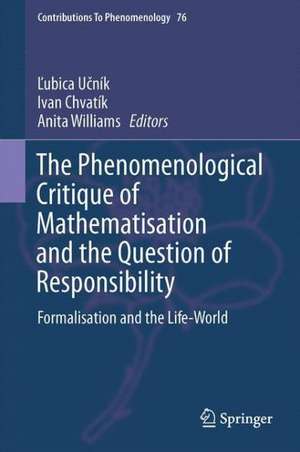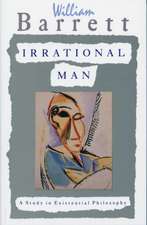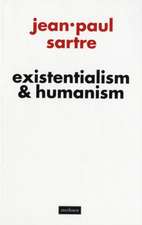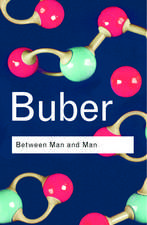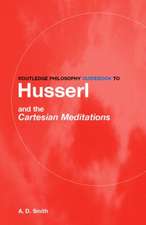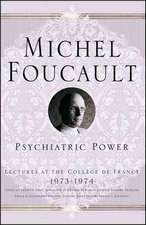The Phenomenological Critique of Mathematisation and the Question of Responsibility: Formalisation and the Life-World: Contributions to Phenomenology, cartea 76
Editat de Ľubica Učník, Ivan Chvatík, Anita Williamsen Limba Engleză Hardback – 8 dec 2014
| Toate formatele și edițiile | Preț | Express |
|---|---|---|
| Paperback (1) | 384.70 lei 6-8 săpt. | |
| Springer International Publishing – 23 aug 2016 | 384.70 lei 6-8 săpt. | |
| Hardback (1) | 391.99 lei 6-8 săpt. | |
| Springer International Publishing – 8 dec 2014 | 391.99 lei 6-8 săpt. |
Din seria Contributions to Phenomenology
- 20%
 Preț: 630.92 lei
Preț: 630.92 lei - 20%
 Preț: 693.49 lei
Preț: 693.49 lei - 18%
 Preț: 989.80 lei
Preț: 989.80 lei - 18%
 Preț: 1230.03 lei
Preț: 1230.03 lei - 15%
 Preț: 645.79 lei
Preț: 645.79 lei - 15%
 Preț: 657.39 lei
Preț: 657.39 lei - 18%
 Preț: 728.28 lei
Preț: 728.28 lei - 15%
 Preț: 635.96 lei
Preț: 635.96 lei - 15%
 Preț: 578.87 lei
Preț: 578.87 lei - 15%
 Preț: 638.43 lei
Preț: 638.43 lei - 15%
 Preț: 691.59 lei
Preț: 691.59 lei - 20%
 Preț: 505.32 lei
Preț: 505.32 lei - 15%
 Preț: 645.28 lei
Preț: 645.28 lei - 15%
 Preț: 637.28 lei
Preț: 637.28 lei - 18%
 Preț: 951.91 lei
Preț: 951.91 lei - 15%
 Preț: 634.00 lei
Preț: 634.00 lei - 15%
 Preț: 646.75 lei
Preț: 646.75 lei - 18%
 Preț: 727.97 lei
Preț: 727.97 lei - 15%
 Preț: 693.71 lei
Preț: 693.71 lei - 18%
 Preț: 729.06 lei
Preț: 729.06 lei - 15%
 Preț: 692.56 lei
Preț: 692.56 lei - 18%
 Preț: 778.94 lei
Preț: 778.94 lei - 18%
 Preț: 780.68 lei
Preț: 780.68 lei - 15%
 Preț: 646.62 lei
Preț: 646.62 lei - 18%
 Preț: 1231.47 lei
Preț: 1231.47 lei - 18%
 Preț: 730.35 lei
Preț: 730.35 lei - 18%
 Preț: 784.61 lei
Preț: 784.61 lei -
 Preț: 358.79 lei
Preț: 358.79 lei
Preț: 391.99 lei
Nou
Puncte Express: 588
Preț estimativ în valută:
75.01€ • 77.84$ • 62.70£
75.01€ • 77.84$ • 62.70£
Carte tipărită la comandă
Livrare economică 15-29 martie
Preluare comenzi: 021 569.72.76
Specificații
ISBN-13: 9783319098272
ISBN-10: 3319098276
Pagini: 220
Ilustrații: X, 223 p.
Dimensiuni: 155 x 235 x 20 mm
Greutate: 0.51 kg
Ediția:2015
Editura: Springer International Publishing
Colecția Springer
Seria Contributions to Phenomenology
Locul publicării:Cham, Switzerland
ISBN-10: 3319098276
Pagini: 220
Ilustrații: X, 223 p.
Dimensiuni: 155 x 235 x 20 mm
Greutate: 0.51 kg
Ediția:2015
Editura: Springer International Publishing
Colecția Springer
Seria Contributions to Phenomenology
Locul publicării:Cham, Switzerland
Public țintă
ResearchCuprins
The Phenomenological Critique of Formalism: Responsibility and the Life-World.- Edmund Husserl’s Die Krisis Der Europäischen Wissenschaften Und Die Transcendentale.- Phänomenologie.- Part One: Patočka’s Phenomenological Philosophy.- Jan Patočka: From the Concept Of Evidence to the Natural World and Beyond.- Patočka on Galileo.- Nostalgia and Phenomenon: Husserl and Patočka on the End of The Ancient Cosmos.- Time in ‘Negative Platonism’.- ‘Quicquid Cogitat’: On the Uses and Disadvantages of Subjectivity.- Part Two: Husserl’s Phenomenology.- Everydayness, Historicity and the World of Science: Husserl’s Life-World Reconsidered.- Mathesis Universalis and the Life-World: Finitude and Responsibility.- Husserl’s Hermeneutical Phenomenology of the Life-World as Culture Reconsidered.- Husserl and Heidegger on The Social Dimensions of the Life-World.- Part Three: The Continued Relevance of the Phenomenological Critique.- Formalisation and Responsibility.- Perceiving Sensible Things: Husserl and the Act of Perception.- Are We Still Afraid of Science?.
Notă biografică
Dr Ľubica Učník is a senior lecturer and academic chair in philosophy at Murdoch University. Her work is derived from Jan Patočka’s rethinking of phenomenological philosophy, namely, his concept of a-subjective phenomenology and his work on the transformation of modern science from Galileo to the present. She published several articles on Husserl’s mathematisation of the Lebenswelt and Patočka’s thinking on modern civilization. She recently completed a book The Life-World and the Crisis of Meaning: Husserl, Heidegger, Arendt and Patočka. Dr Ivan Chvatík Dr h. c. is the director of Jan Patočka Archive, an archive he established in 1990. In 1990, he received the Prize from the Czechoslovak Academy of Sciences for the “Jan Patočka Archive Collection”, published in underground 1977-1989. Since 1993, he has been the co-director of the Center for Theoretical Study, the Institute for Advanced Study at Charles University and the Czech Academy of Sciences. In 1997, he received Jan Patočka Memorial Medal from the Czech Academy of Sciences in recognition of his role in furthering scientific research. Since 1990, he has edited 25 volumes of Jan Patočka's life works. Dr Anita Williams is a researcher in philosophy and psychology at Murdoch University. Her research is broadly focused on the history and philosophy of psychology. She is interested in phenomenology because it provides a way to question the increasingly taken for granted adoption of the scientific method for investigating human thinking and morality. Her recent work adopts Husserl’s and Heidegger’s critiques of formalisation to critique the expanding field of cognitive neuroscience.
Textul de pe ultima copertă
This edited collection discusses phenomenological critiques of formalism and their relevance to the problem of responsibility and the life-world. The authors deal with themes of formalisation of knowledge in connection to the life-world, the natural world, the history of science and our responsibility for both our epistemic claims and the world in which we live. Readers will discover critiques of formalisation, the life-world and responsibility, and a collation and comparison of Patočka’s and Husserl’s work on these themes.
Considerable literature on Husserl is presented here and the two themes of epistemic responsibility and the life-world are discussed together. This work specifically emphasises the interrelatedness of these existential aspects of his work – self-responsibility and the crisis – as not only epistemological, but also related to human life.
This volume also introduces Jan Patočka to English-speaking readers as a phenomenologist in his own right. Patočka shows us, in particular, the significance of the modern abyss between our thinking and the world. Readers will discover that this abyss is of concern for our everyday experience because it leads to a rupture in our understanding of the world: between the world of our living and its scientific construct.
We see that Patočka continually emphasised the relevance of Husserl’s work to existential questions relating to human responsibility and the life-world, which he admits is left largely implicit in Husserl’s work. This edited collection will spark discussion on the question of responsibility against the backdrop of formalised knowledge which is increasingly inaccessible to human understanding.
Despite the complexity of some of the analysed ideas, the authors discuss these themes in a clear and readable way. This work is scholarly, exact in its discussion and authoritative in its reading, but at the same time accessible to anyone motivated to understandthese debates.
Considerable literature on Husserl is presented here and the two themes of epistemic responsibility and the life-world are discussed together. This work specifically emphasises the interrelatedness of these existential aspects of his work – self-responsibility and the crisis – as not only epistemological, but also related to human life.
This volume also introduces Jan Patočka to English-speaking readers as a phenomenologist in his own right. Patočka shows us, in particular, the significance of the modern abyss between our thinking and the world. Readers will discover that this abyss is of concern for our everyday experience because it leads to a rupture in our understanding of the world: between the world of our living and its scientific construct.
We see that Patočka continually emphasised the relevance of Husserl’s work to existential questions relating to human responsibility and the life-world, which he admits is left largely implicit in Husserl’s work. This edited collection will spark discussion on the question of responsibility against the backdrop of formalised knowledge which is increasingly inaccessible to human understanding.
Despite the complexity of some of the analysed ideas, the authors discuss these themes in a clear and readable way. This work is scholarly, exact in its discussion and authoritative in its reading, but at the same time accessible to anyone motivated to understandthese debates.
Caracteristici
Deals with the themes of critiques of formalization, life-world and responsibility Draws together and compares Patocka’s and Husserl’s work on these themes Prompts discussion on the question of responsibility against the backdrop of formalized knowledge Includes supplementary material: sn.pub/extras
